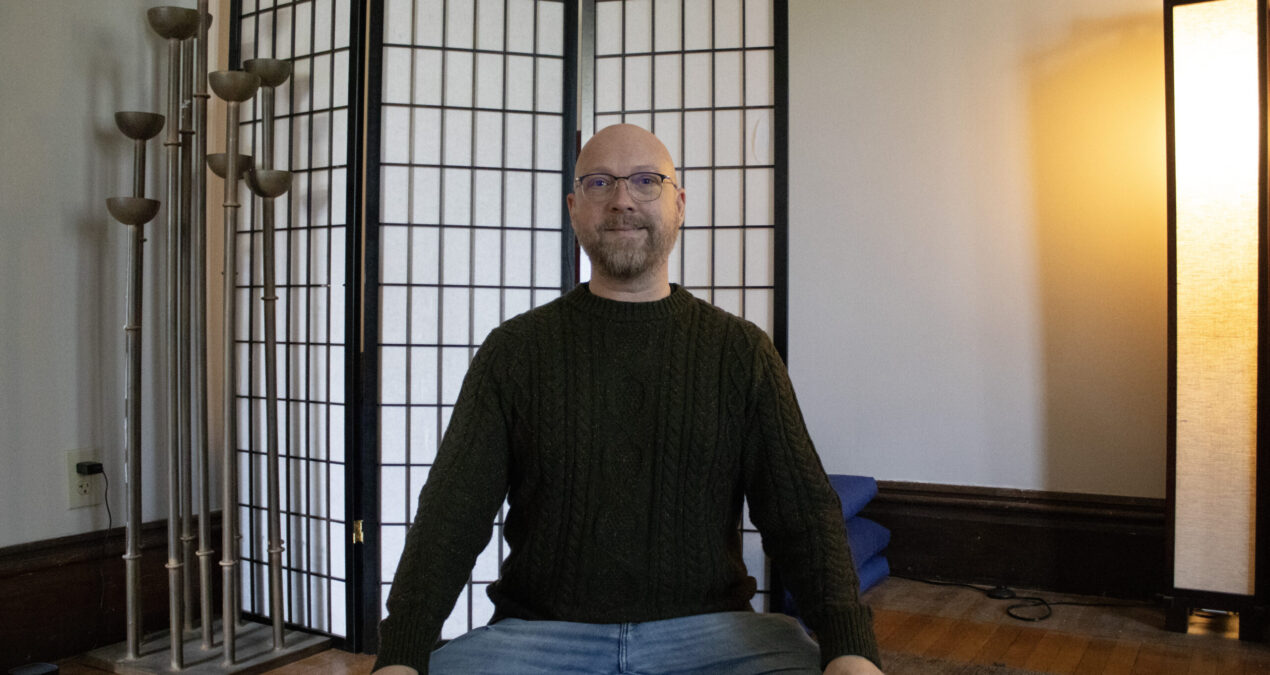Mia Fischel, Features Editor–
Five students are seated on blue cushions in a small, dimly lit room, waiting for Lama Adam Berner, the Buddhist and Contemplative Practice Coordinator at Denison. The room, located in the Spiritual Life Center, is the constant setting for Berner’s weekly drop-in meditation sessions.
The sessions are open to anyone, regardless of religious identity.
“I can give this to you as Buddhism or as a secular way or anywhere in between, what do you want? To me it’s all the same, it’s just a different language,” Berner said.
For a brief period in his life, Berner was Christian. After getting into Taoism and meditation as comfort-oriented practices, he decided to learn from the Buddhists.
“I’m always a skeptic. It’s funny because in a way, skepticism is what reveals real faith, you know, because if you can continually be skeptical about stuff, then what’s left is just what’s true,” Berner said.
From 2016-2020, Berner completed a traditional three-year meditative retreat in New York. His days started with a gong at 4 a.m. and concluded after 14 hours of meditation. Sleep was scarce. Other than some maroon and yellow clothes and a couple books, Berner didn’t bring anything aside from paper, pens, and envelopes to write letters to family and friends.
Fifteen thousand hours of meditation later, Berner was awarded with the title of “Lama.”
“Really you do it because you know you can help everyone. We need more people who are connected with each other and their feelings. You’re not even supposed to think about the fact that you’re going to get a title at the end, you know?” Berner said.
He’s still in contact with friends from the retreat. With a friend who lives in Mississippi, Berner started the podcast “Lama Taboot” where they bond over Buddhism and music, especially the band Phish.
Before he learned to meditate, Berner was a musician. He graduated with a music degree and played the electric bass professionally for eight years, but stopped when he got further into meditation. While he wasn’t always a Buddhist, he’s always been a teacher.
“I’ve always taught, so like when I was a musician I taught music. And then when I got out of the retreat I was fully a Buddhist pastor for two years,” Berner said. “I know I have skill for explaining things and connecting with people in a person-centered way, so that’s just how I feel I can be useful.”
Berner is trained in trauma-sensitive mindfulness, which means that he plays closer attention to the specific needs of an individual. With a flux in wellness apps and self-proclaimed gurus, Berner hopes to keep mindfulness accessible but also ensure quality and safety.
“Maybe even 100 years ago, you pretty much had to climb a mountain to find a teacher or go to a whole other country, and now it’s just everywhere. It’s kind of like the pharmacy doors are unlocked and you can walk in and take whatever you want, you know, and so that’s causing all kinds of havoc,” Berner said. “You can hurt yourself with meditation. Meditation is very much about balance.”
Berner founded “Mindfulness for Life,” a charity which aims to bring trauma-sensitive mindfulness to underprivileged communities. Once a week, Berner works with the Boys and Girls Club in Newark.
“I never envisioned myself doing this, but I’m teaching kindergarten through eighth grade mindfulness,” Berner said. “We’re playing a lot of games and talking about feelings and strategies for dealing with stress and anger.”
Even at the introductory level, meditation can be a great way to calm and ground yourself. But it’s important not to limit meditation to a specific method, or a specific technique that’s supposed to be calming.
A lot of meditation is about recognizing and sitting with your thoughts. Though it certainly helps, it’s not going to have an instant reward.
“The No. 1 misconception is that meditation should clear your mind. That it should just be blank or you should be able to control your thoughts. It’s not like that, it’s much more that the way you’re reacting to your thoughts is the problem. So can you just observe them as they are without feeling like you have to act because they’re there,” Berner said.
Meditation is different for everybody. At Denison, the Spiritual Life Center is a great space to learn meditation at any level. Through April 8 to April 13, the Hoaglin Center is hosting “Healthy Minds Week” which includes events like meditation with Berner and President Weinberg, a nature hike, flow yoga, and making tea.
“This matters to everybody. It should matter to everybody,” Berner said. “In my opinion, it’s the foundational, fundamental skill. You can’t make good habits without mindfulness. You can’t break bad habits without mindfulness.”

